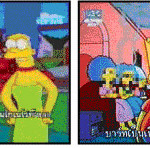Going Global, Part 2: First some basics: Any document consists of content and layout. The multilingual publishing process consists of recreating a document in the target language that is equivalent to the source document in both content and layout. So, the document translation process has two main subprocesses: content translation and layout adjustment. Content translation […]
Superior Translation Projects Begin with Proper Preparation
Proper preparation of your source text will result in a superior translated product. Keeping in mind a few simple steps will make sure your translation projects begin in the right direction. Before all other considerations, make sure that the source text clearly and accurately describes your intended message. Ambiguous or incorrect descriptions will limit the […]
Can Something Funny in One Language, be Funny in Another?
Funny Here. Funny There. Springtime cleaning treasures. In rummaging through the basement, I came across a box with my Dutch cartoon collection. In it I found Dutch copies of Garfield, the comic strip about the fuzzy, orange tabby cat’s reflections on eating, diets and exertion. Humor requires shared values and references. When something is funny […]
Portuguese Spelling Agreement
About The Portuguese Spelling Agreement (Acordo Ortográfico) aims to establish a unified spelling code for all Portuguese-speaking countries. Currently, the spelling rules differ across all Portuguese-speaking nations. The spelling discrepancies between Portugal and Brazil are of particular interest to U.S. based companies, because these contain the world’s two largest Portuguese-speaking populations, and are therefore the […]
The Fifth Element
In the vast localization sea, we are all enrolled in a tireless quest, trying to find the right definition of quality and to identify substantial boundaries that will finally allow us to grasp it. However, despite its heavy presence in blogs, tweets and forums, it constantly manages to leak away from our objective variables and […]
Do you speak Franglais?
We live in a rapidly-changing globalized world, where English has won the battle to become “the” global language. However, nations and communities around the world are still keen on preserving their own identity, culture, and language. While France drags on its debate about national identity, 80% of the French people polled claim that the French […]
Going Global With Multilingual Publishing
The great challenge of desktop publishing was always to develop techniques to allow changing the content without losing the whole work of accomplished formatting. It is called “processes optimization” — a utopia for many, a goal for others. The result brings time and cost reductions while preserving the graphic excellence of the traditional publishing processes. […]
MDD 2007/47/EC- Final Thoughts on Translation Requirements As We Approach the Compliance Deadline
The deadline for manufacturers to mandatorily comply with MDD 2007/47/EC is finally here. As we all know by now, this is a huge milestone after years of planning, reviewing, and an adoption process that started back in 2005. Now, with 5 years in the making, we are finally to the point where medical device manufacturers […]
When it Comes to Translations, Bend ‘m Like Beckham
Translations and soccer do not seem to have a lot in common at first. But when viewed through the perspective of quality management system ISO 9001, they may have some surprising common ground. With the 2010 World Cup kicking off in just four months in South Africa, soccer fever is starting to rise. Soccer aficionados will be glued […]
Italy Ministry of Health Simplifies Medical Device Registration
Effective February 6, 2010, all medical device manufacturers will need to comply with the Italian Health Ministry’s revised decree that regulates medical device registration. Italy — A New Ministry of Health Decree Should Simplify the Registration Process for Medical Devices The new decree, published on 21 December 2009, replaces the controversial decree of 20 February […]





